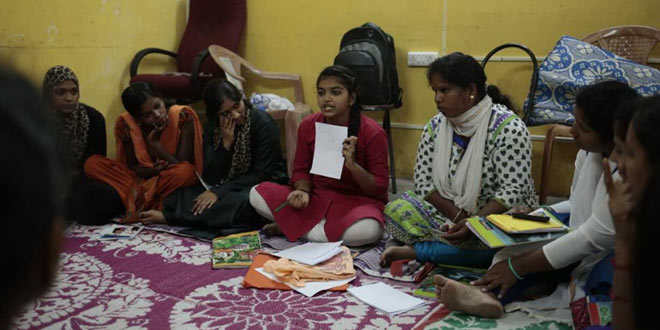New Delhi: When 29-year-old Dilip Pattubala started a community service club in college where students would give computer lessons in government school, little did he knew that he will end up being in development sector, especially improving the state of menstrual hygiene in India by creating awareness. After completing his bachelors in Business Management from Bengaluru, Dilip joined social organisations like Akshaya Patra Foundation and Help Age India. After all this, Dilip came to a conclusion that he wants to continue doing social work and for the same he went abroad to study Social Welfare and Social Policy.
Shedding light on how Dilip made his way from business management to improving the state of menstrual hygiene in India, Dilp recalls,
After my Masters I came back to Bengaluru and started working with Pollinate Energy, working to eradicate energy poverty in Bengaluru’s slums. That is when we came to know that accessibility to healthy menstrual hygiene practices is low. To understand the state of menstrual hygiene, we did a small survey, covering 250 women in the slum we were working with. That is when we realised the issue.
The survey results showed that almost 82 per cent of the 250 women didn’t use sanitary napkins, reason being accessibility, affordability, and lack of awareness. Astonished with the status, Dilip took the findings to the organisation and proposed to work on it, but since the institution he was working for was strongly focused on renewable energy, they denied the proposal. But Dilip didn’t give up. In June 2014, with no experience and bank balance and a thought to do something for women, Dilip started Sukhibhava.
With an initial thought of solving the problem by providing menstrual hygiene products, we started Sukhibhava. We procured sanitary napkins from manufacturers at a subsidised rate and distributed it among rural women. But, three months down the line, we got a reality check when we did a ground report. We realised that despite getting sanitary napkins women were not ready to make use of them, reason being, lack of awareness. They didn’t know the health benefits of it. That is when we decided to shift our focus to creating awareness, tells Dilip.
For mass awareness, the team started visiting slums with speakers who would talk about anything and everything related to menstrual hygiene, assuming women and girls understood them. But after some time, the team realised that women hardly perceived anything, reason being, Sukhibhava was talking about the subject these women don’t discuss even in closed doors. The content on menstrual hygiene the team was providing was so elaborate that it was difficult for women to absorb it in one hour.
From there we landed to what we are doing now. Unless we provide awareness, reduce stigma and improve accessibility to affordable products, and educate the women about disposal of products, we are not solving the problem. So, we focus on each area, tells Dilip.
How Sukhibhava Works Today
The Sukhibhava team identifies a community that is either an urban slum or rural village. Once identified, the team does an initial assessment of whether their work is required in the particular community. After this, they identify women within the community to become their ‘community resource person’ (CSR).
Also Read: Moon Time: An A-Z Guide To Menstrual Hygiene By US Returned Software Professional
Further explaining the process, Dilip says,
These are the women who are school dropouts or not working anywhere. We bring them on board and train them for a month to become ‘Independent Menstrual Hygiene Facilitator’. Once they are trained, they are allowed to attend 10-15 different communities. They go to these communities and form groups of 10-15 women of different age groups. Like older women in group, adolescent girls in one group, so on and so forth. The reason behind creating such groups is to create safe space that is a space where women and girls can open up without any fear of being judged. Once a group is formed, they meet once a week for a month. With the help of different games and activities, CSR talks about different aspects of menstruation, puberty, and other things.
Once women and girls have understood the concept, they are provided menstrual hygiene products at a subsidised rate. The team provides a bucket full of menstrual hygiene products to choose from. Women and girls can choose it as per their preference. Apart from this, the team provides free sanitary napkins to school girls.
Till now, Sukhibhava has reached out to over 48,200 women. The team expects to reach out to 2.5 lakh women this year. Also, the team has sponsored menstrual hygiene products for around 6,200 school girls.
Recently, the team introduced Period Fellowship Programme through which 16 selected fellows will be representing Sukhibhava in six different states – Karnataka, Uttar Pradhesh, Jharkhand, Rajasthan, Maharashtra and Tamil Nadu.
NDTV – Dettol Banega Swachh India campaign lends support to the Government of India’s Swachh Bharat Mission (SBM). Helmed by Campaign Ambassador Amitabh Bachchan, the campaign aims to spread awareness about hygiene and sanitation, the importance of building toilets and making India open defecation free (ODF) by October 2019, a target set by Prime Minister Narendra Modi, when he launched Swachh Bharat Abhiyan in 2014. Over the years, the campaign has widened its scope to cover issues like air pollution, waste management, plastic ban, manual scavenging and menstrual hygiene. The campaign has also focused extensively on marine pollution, clean Ganga Project and rejuvenation of Yamuna, two of India’s major river bodies.



























